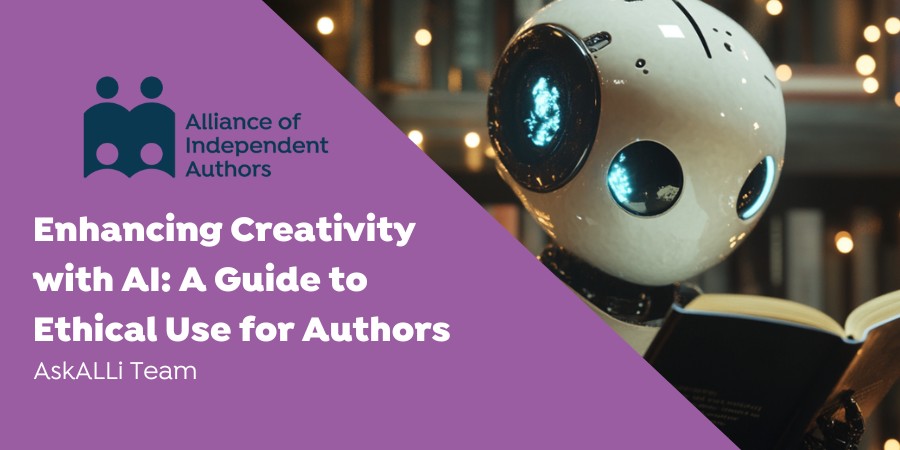Creativity with AI is stirring up a lot of opinions in the writing world, especially about whether it has a place in the creative process. ALLi's AI policies can be accessed here. In this post, we’re not debating whether you should use AI—rather, if you do, we’ll look at how to use it effectively and ethically to assist you with brainstorming, help organize research, or generate fresh ideas. And demonstrate how AI tools don’t replace the need for human creativity and insight.
 According to ALLi’s Ethical Guidelines for Authors, to Amazon and other publishing services, AI tools serve as helpers, not as creators.
According to ALLi’s Ethical Guidelines for Authors, to Amazon and other publishing services, AI tools serve as helpers, not as creators.
They can’t create genuine human connections, but can make some aspects of the writing and publishing processes a little easier, speeding up certain tasks and allowing authors to focus on what matters: crafting unique stories and connecting with readers.
Some AI Tools for Creative Writing
In this guide, we’re exploring AI tools that authors are using in writing fiction, nonfiction and poetry, featuring firsthand experiences from ALLi members.
You’ll find practical ways to use AI without compromising your creative voice and learn how to set ethical boundaries, if you choose to use AI tools, so your work remains authentically yours.
Here’s a quick look at the major AI tools we’ll discuss:
- ChatGPT: Developed by OpenAI, ChatGPT is a flexible assistant for brainstorming, outlining, and generating dialogue. Writers use it to break past creative blocks or draft ideas, while retaining control over the final language and tone.
- Claude: Known for intuitive brainstorming, Claude is especially helpful in character development and dialogue. Many authors use it to refine scenes or explore different narrative possibilities.
- Sudowrite: Tailored specifically for fiction writers, Sudowrite assists with world-building, character ideas, sensory details, and brainstorming plot twists. Gupta, its creator, stresses that Sudowrite is meant to enhance, not replace, the creative process.
- Perplexity.ai: A powerful research tool for writers delving into specialized topics, Perplexity.ai allows for quick, citation-based searches, making it ideal for nonfiction authors or those needing reliable research support.
- NotebookLM: Google’s NotebookLM focuses on organizing and analyzing uploaded documents. Writers use it to manage research, themes, and notes for large projects while retaining control over their source material.
- Otter.ai: Known for transcription, Otter.ai is indispensable for nonfiction writers, journalists, and researchers, converting interviews and conversations into searchable text, which streamlines note-taking and makes it easy to access key quotes or details.
- ProWritingAid: A favorite for editing, ProWritingAid offers insights into style, tone, and readability while safeguarding user content. Authors looking for AI-assisted editing without data sharing often choose this tool.
Each of these tools has unique strengths, and when used thoughtfully, they can enhance both the creative and organizational aspects of the writing process.
The Role of AI in Fiction Writing

J. F. Penn
AI offers fiction writers new ways to brainstorm ideas, enhance scenes, and bring detail to life. According to ALLi’s ethical guidelines, authors should use AI as a creative assistant rather than a replacement, maintaining responsibility for originality and ensuring their unique voice shines through. While AI can help with structure and inspiration, the essence of storytelling comes from the writer’s perspective and creativity.
Award-winning author J.F. Penn uses AI as a support tool across her creative process, from research to planning complex timelines. “I use Perplexity.ai to research specific topics and delve deeper into the citations,” Penn says. She combines this with brainstorming on ChatGPT and Claude, often working through detailed prompts to create settings and sensory details that bring her stories to life.
For her folk horror novel, Blood Vintage, Penn used ChatGPT to help plan a year-long cycle from the perspective of the seasons in Somerset, England, overlaid with the phases of the moon and a biodynamic calendar. “I find these tools make the research and writing process a lot more fun, and I can stay in flow more easily,” she adds.

Fay A. Klingler
ALLi Campaigns Manager and author Matty Dalrymple also finds AI helpful in overcoming the blank slate stage of character development. She often uses prompts like “give me a physical description of a man who owns a pawn shop in Western Maryland” to kickstart ideas. “The AI provides a detailed paragraph that can provide inspiration for my further refinement,” Dalrymple explains. Using AI in this way allows her to capture details she may not have considered, adding depth to her characters while maintaining creative control.
Author Fay Klingler uses AI to break through creative blocks when she needs to move a story forward. When stuck on how a character might achieve a specific goal, she asks ChatGPT for a list of possible actions. “I don’t necessarily use one of those ideas,” Klingler says, “but it will spark my own creativity with ideas I hadn’t thought of before.” Klingler also finds AI useful for drafting book descriptions, which she then refines based on her understanding of her audience and marketing goals. For her, AI serves as a creative nudge rather than a solution, giving her the momentum to keep the story flowing.
Avoiding Cookie-Cutter Writing
ALLi’s guidelines caution against relying too heavily on AI-generated text. Effective writing, storytelling, and author satisfaction requires the distinct voice and perspective that only you can provide.
Ultimately, the best AI use emphasizes the writer’s voice and viewpoint. As Penn and Dalrymple demonstrate, AI tools are most powerful when they supporting the creative process, but never dictating it.
AI outputs are suggestions, not finished content.
The Role of AI in Nonfiction Writing
For nonfiction writers, AI can be a valuable tool in managing and organizing complex information, particularly in research-heavy projects. While AI doesn’t replace the author’s insight, it assists in organizing extensive material and provides inspiration for marketing and drafting tasks.

Howard Lovy
Author Howard Lovy, currently working on a book about fighting antisemitism, relies on AI to streamline his research process. Lovy uses Otter.ai to transcribe hours of interviews with experts, making conversations searchable and enabling him to extract relevant quotes efficiently.
For his research on policy documents and lawsuits, Lovy uses NotebookLM to categorize information and analyze key themes.
“AI tools don’t do the creative work for me,” Lovy explains. “They help me access what’s important or relevant and allow me to make connections between disparate sources. Ultimately, I’m the one shaping the story.”
J.F. Penn also uses NotebookLM to organize her nonfiction research, particularly when exploring thematic content. By uploading her notes and source material, Penn is able to efficiently navigate her research, keeping track of themes and ensuring her ideas align throughout her work. NotebookLM allows her to remain organized and focused, making it easier to explore the material without losing sight of her narrative.
AI also assists nonfiction authors in drafting and marketing their work. Fay Klingler, for example, finds AI helpful for brainstorming descriptions and selecting market categories. When creating descriptions, Klingler combines AI’s suggestions with her knowledge of Amazon’s top-selling categories, refining the output based on her audience research. For Klingler, AI offers a starting point but requires her to adapt and refine it for optimal results.

Cari Galeziewski
Cari Galeziewski uses AI to refine her marketing materials and introductory letters. AI helps her brainstorm ideas, draft letters, and polish descriptions, giving her the structure she needs to make a professional first impression. In addition to supporting her with these practical tasks, Galeziewski also finds that AI enhances her efforts to align with her marketing goals.
ALLi’s guidelines emphasize transparency when using AI in nonfiction, particularly in research and drafting phases. Nonfiction authors are encouraged to differentiate between AI-generated and AI-assisted content, disclosing the role of AI in their work when required by platforms like Amazon KDP. AI-generated content refers to material primarily created by AI with minimal human input, while AI-assisted content describes work where AI provided support but was shaped and significantly edited by the author. This distinction is essential for upholding ethical standards, maintaining accuracy, and preserving the author’s credibility.
By treating AI as a supportive tool, nonfiction authors like Lovy, Penn, Klingler, and Galeziewski can enhance their organization, streamline marketing, and ensure their work reflects their own voices and insights.
Balancing AI with Creativity
While AI can be a powerful tool for brainstorming and organizing ideas, authors are encouraged to “double down on being human.”
ALLi’s ethical guidelines emphasize that an authentic, intentional voice is what ultimately connects readers to a work. AI may support a writer’s process, but creativity, originality and heart communication come from the author’s personal insights and style.
Dalrymple values AI for its ability to help her past initial creative blocks, but she remains mindful of preserving her voice. “The AI provides a detailed paragraph that can inspire further refinement,” Dalrymple explains. However, she doesn’t rely on AI-generated content without thorough review and alterations.

John Straughn
Privacy is another consideration. Author John Straughn initially used ChatGPT to help refine chapters of his novel but grew concerned about privacy and originality. “It’s sucking up all my creative content,” he says.
Worried about whether his material might be repurposed or appear in AI-generated outputs for other users, Straughn transitioned to ProWritingAid, a tool he trusts more for its commitment to user privacy. Straughn’s shift underscores the importance of carefully selecting tools that align with ethical standards and protect a writer’s creative integrity.
ALLi’s guidelines also highlight the ethical boundary between responsible and irresponsible AI use. Authors are warned against the unethical practice of cutting and pasting AI-generated text without revision, which risks producing content that is formulaic or even inadvertently offensive.
Using AI output as a starting point, rather than as a final product, allows authors to infuse their work with originality and thoughtfulness. It’s the author’s job to adapt and refine any AI-generated text, ensuring it reflects their voice and meets professional standards.
By treating AI suggestions as prompts and maintaining ethical boundaries, writers can responsibly leverage technology while preserving what makes their work distinctively human.
Future Outlook and Final Thoughts
 In an already saturated book market, the value of human voice and creativity remain more vital as ever. While AI tools can help with organization, brainstorming, and even marketing, they don’t replace the connection readers and writers are seeking.
In an already saturated book market, the value of human voice and creativity remain more vital as ever. While AI tools can help with organization, brainstorming, and even marketing, they don’t replace the connection readers and writers are seeking.
ALLi members who have embraced AI do so with an emphasis on responsibility and ethical use. Authors like J.F. Penn, Howard Lovy, Matty Dalrymple, Fay Klingler, and Cari Galeziewski demonstrate that AI can be an effective creative partner, whether for drafting, organizing complex research, or exploring fresh ideas.
By using AI as a supportive tool, these authors enhance their process without compromising their own voice and vision. Readers will continue to gravitate toward voices that feel real, intentional, and engaging—a demand that AI-generated content alone can’t fulfill.
As AI becomes more sophisticated, writers can use it to deepen their engagement with readers, maintaining creativity and agency at the heart of their work. Embracing AI responsibly ensures that writers continue to stand out in a crowded marketplace, offering stories and insights that are uniquely their own.
The future of writing belongs to those who see AI as an assistant, not an author.
Further Resources
For authors looking to further explore AI’s role in writing and publishing, here are some valuable resources:
- AI for Authors: Ethical Guidelines – This “pillar post” provides a comprehensive guide on ALLi’s position and recommendations for ethical AI use.
- ALLi AI Policy – This policy reflects ALLi’s commitment to transparency, outlining ethical standards and guidelines for AI in the publishing space.
- AI-related Blog Posts – Browse these blog posts for timely discussions and updates on AI in publishing, providing snapshot perspectives as the technology and its implications evolve.
- Guidelines for Authors to Create their Own AI Policy – A resource exclusive to ALLi members, offering sample policies to help authors develop their own AI use guidelines.
These resources provide a foundation for authors to make informed and ethical decisions in integrating AI into their creative process.
Thoughts or further questions on this post or any self-publishing issue?
 If you’re an ALLi member, head over to the SelfPubConnect forum for support from our experienced community of indie authors, advisors, and our own ALLi team. Simply create an account (if you haven’t already) to request to join the forum and get going.
If you’re an ALLi member, head over to the SelfPubConnect forum for support from our experienced community of indie authors, advisors, and our own ALLi team. Simply create an account (if you haven’t already) to request to join the forum and get going.
Non-members looking for more information can search our extensive archive of blog posts and podcast episodes packed with tips and advice at ALLi's Self-Publishing Advice Center.





Thanks for this practical, ethics-focused guide!
There is no ethical usage of generative AI based on stolen content. This simply advantages those who wish to produce cheap art and pay artists little or nothing at all.
Very thoughtful post. I was just reading an interesting New Yorker piece that I think amplifies many of the excellent points you make:
https://www.newyorker.com/culture/annals-of-inquiry/what-kind-of-writer-is-chatgpt
There is no ethical use of generative AI based on stolen works. The only people this benefits is those who would prefer to produce cheap art and pay artists less or nothing at all.
It’s abhorrent that an organization supposedly oriented toward helping and advocating for indie authors would promote this slop.
Well, I’m old-school, too. I began my journalism career using a manual typewriter. Since then, I’ve embraced the word processor, the spell-checker, and now AI tools that help me sort through countless hours of interview transcripts and make connections between disparate sources like policy documents and lawsuits for a complicated book I’m writing. At no time does a computer program do any writing for me. But it sure does free me up to focus more on my creativity.